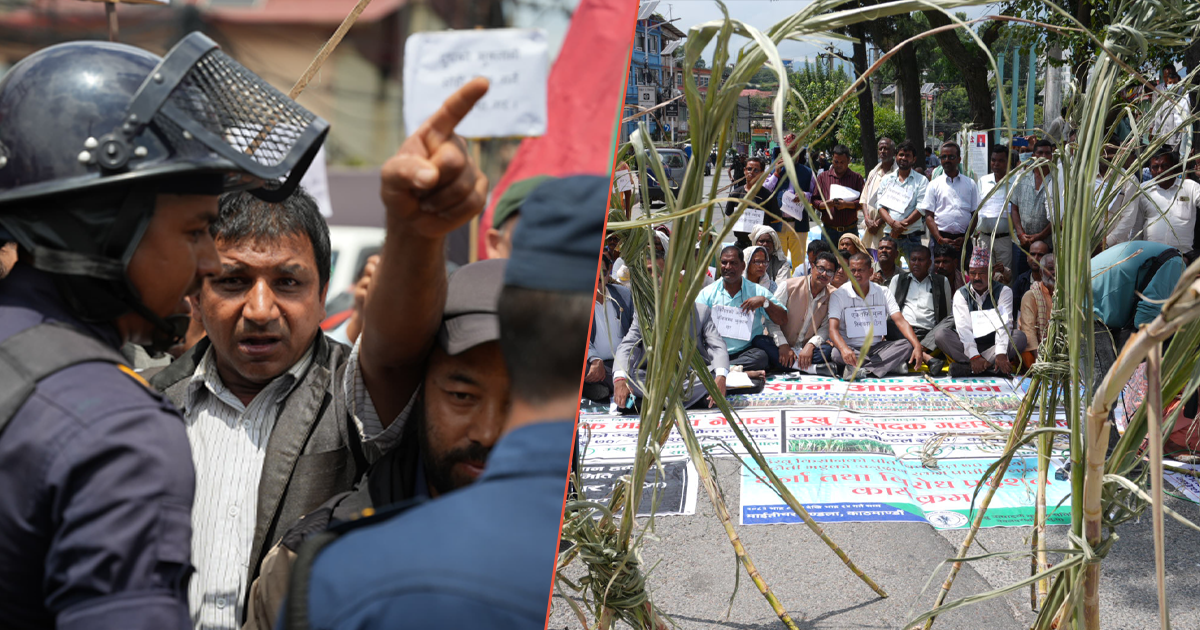Kathmandu: Farmers across Nepal are once again preparing to launch nationwide protests, saying the government has failed to ensure they are paid for their hard-earned produce.
Despite Nepal being described as an agricultural country, those working the fields claim they are being neglected and forced into repeated demonstrations simply to secure payments guaranteed by law and policy. From milk producers to sugarcane growers, discontent is spreading, and both groups are now threatening strong measures if their dues are not released immediately.
Milk producers say they are at breaking point. For months, dairy farmers have not received payments from the state-owned Dairy Development Corporation (DDC) as well as several private dairy industries. The Central Dairy Cooperative Union estimates that farmers are owed around Rs 3.5 billion in total — Rs 2.5 billion by private dairies and nearly Rs 1 billion by DDC alone.
Under existing arrangements, dairy farmers are supposed to be paid every 15 days after they deliver milk to collection centres. However, payments have been delayed since January, forcing farmers to borrow money at high interest rates just to cover daily expenses such as animal feed, medicines, and household needs.
“We are left with no choice but to protest,” said a cooperative leader from Chitwan, one of the country’s major milk-producing districts. “The government calls agriculture the backbone of the economy, but when the backbone is this neglected, the whole body is bound to collapse.”
Frustrated by the months-long delays, milk producers have announced sit-ins beginning Thursday. Demonstrations will be staged outside DDC offices across the country, as well as at the headquarters of Nepal Dairy Association and Dairy Industry Association. Farmers say their demand is simple: immediate release of pending payments.
Officials at DDC argue that the corporation’s financial difficulties have created the backlog. According to them, DDC is currently sitting on nearly Rs 950 million worth of unsold dairy products — mainly butter and powdered milk — that have not moved in the market. This unsold stock has drained its working capital, leaving the corporation unable to pay farmers on time.
“We are not refusing to pay the farmers,” a DDC spokesperson explained. “But unless these products are sold, our cash flow remains blocked. We hope that the demand will rise during upcoming festivals like Dashain and Tihar, which could help us settle the dues.”
To ease the pressure, the government has already provided DDC with concessional loans worth Rs 900 million. Yet, large arrears remain, and farmers insist that loans alone cannot resolve the structural problems of poor market planning and weak state support for agriculture.
As dairy farmers gear up for protests, sugarcane farmers are also preparing for an indefinite highway blockade beginning September 10 in Hariwan, Sarlahi. The Sugarcane Producers’ Federation says the government has failed to provide the full subsidy it promised earlier this year.
According to the federation, farmers were to receive Rs 70 per quintal in subsidies. However, the government has only released Rs 35 so far, leaving the remaining half unpaid. Farmers from eight major sugarcane-growing districts — including Morang, Sarlahi, Bara, and Parsa — will participate in the highway blockade, which they warn will continue until all dues are cleared.
“We will not stop our movement until Rs 70 per quintal is released,” said federation president Shyambabu Rai. “The government tried to silence us by paying half, but we reject this halfway approach. Our costs have doubled, and we cannot sustain production under these conditions.”
The delay in payments has pushed many farmers into economic distress. Some dairy producers say they are considering selling off their cows because they can no longer afford feed. Sugarcane farmers, meanwhile, complain that they are being forced to sell their produce at a loss, while sugar mills and the government delay or deny payments.
Both groups stress that their protests are not political but purely about survival. They say the state must take responsibility for ensuring that farmers are not left stranded after fulfilling their obligations.
Agriculture contributes around one-quarter of Nepal’s GDP and provides livelihoods for a majority of its population. However, farmers argue that repeated delays in payment and lack of government accountability have discouraged younger generations from staying in farming. Instead, many are seeking work abroad, worsening the country’s dependence on food imports.
Experts warn that unless the government addresses these recurring disputes with structural reforms, Nepal’s food security could be threatened. Ensuring timely payment, strengthening cooperatives, and creating better market mechanisms are seen as essential steps to protect both producers and consumers.
As dairy farmers prepare to stage sit-ins and sugarcane farmers plan to block highways, the government faces mounting pressure to act quickly. Farmers have made it clear that they are unwilling to back down this time.
Unless urgent steps are taken to release overdue payments and guarantee fair treatment, the coming weeks could see widespread disruptions, from halted milk supplies to blocked transport routes in the Terai. With festival season approaching, the impact of these protests could be felt across the country.
For now, Nepal’s farmers remain defiant. As one protest leader summed up: “We are not begging. We are only demanding what is rightfully ours. If the government fails to understand this, then the streets will.”



Comment Here